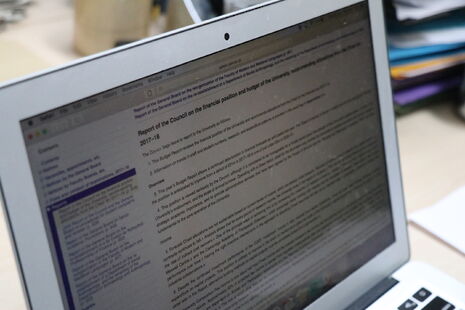Analysis: How did the University end up with a £21 million deficit?
Phoebe Gargaro explains why the University is yet again forecast to run a deficit

On the 13th of June, the University Council released its annual budget report, which found that the University of Cambridge is expected to have a deficit of £21 million in 2017-18. The report justified running a deficit by stressing that it “enables the University to maintain momentum and invest in areas of strategic academic importance, and to provide administrative services that have been agreed by the Heads of Schools and the Planning and Resources Committee (‘PRC’) as being fundamental to the core operation of the University”. The report also stressed that the deficit was sustainable “in the short-term only”.
However, the financial issues currently suffered by the University have already plagued their finances for some years. In 2015-16, the University’s finances, known collectively as ‘the Chest’, were forecast to run a £2.7 million surplus, but ended up in a £2.1 million deficit. The picture improved little in the following year, when the Chest is forecast to have run a £7.1 million deficit.
The report concedes that spending on some capital projects has been higher than originally forecast, leading to a reduction in the University’s cash holdings. As a result, the report stresses, “expenditure must be contained.”
The report comes after significant overspend on the University’s development at Eddington, and amid plans for other large-scale capital investment, including a £300 million redevelopment of Cavendish Laboratory. The report addressed the difficulty in balancing a need to renovate ageing University buildings with the current lack of available funds. According to the report, the cost of all renovations would total £4 billion, but “University resources in isolation cannot deliver development on this scale and it is possible that some projects will not be taken forward.”
More general changes to the education sector have also taken their toll on University finances. Increasing competition for the funding allocated to universities by the Higher Education Funding Council for England (HEFCE) have meant that the sum Cambridge receives for share has historically diminished year on year. However, this year the amount receives has in fact increased, as has HEFCE funding for research.
External circumstances are also thought to have played a part in the University’s financial situation. The “major repercussions” of Brexit were indicated to be a particularly significant impact, especially on the number of EU nationals studying and working at the University. Fees paid by students make up roughly half of the University’s income, and plans to reduce the deficit hinge on this source of income increasing. Despite plans to allow universities to increase fees under the Higher Education Bill, the report does not anticipate that any changes will be significant. The only way to increase fee income, therefore, would be by increasing student numbers. However, after Britain leaves the EU, recruiting EU students, particularly the postgraduates for which the University receives a large amount of funding, could prove challenging.
Funds from the European Union also comprise 12.6 per cent of all research income, and 18 per cent of grants and awards. Despite the establishment of an EU Working Group to ensure the strong position of the University during Brexit, there are still grave concerns over the implications of potentially losing out on this money.
Indirect cost recovery - the cost incurred when external research projects are sponsored by the University - has also made a dent in the University’s finances, with the report revealing that for every £1 gained by the research, 15 pence is lost. As a result, the University plan to seek funding from industry for future research projects.
As the University seeks to regain solvency, ideological shifts will also be required. As part of new proposals for resource allocation, individual Schools’ funding would be tied to their previous financial performance, placing greater importance on the need for cost-cutting at all levels of the University. Academics will be required to give additional financial focus to their work, and “engage in strategically important activity that is also financially sustainable”
 Comment / College rivalry should not become college snobbery30 January 2026
Comment / College rivalry should not become college snobbery30 January 2026 News / Downing Bar dodges college takeover31 January 2026
News / Downing Bar dodges college takeover31 January 2026 News / Cambridge for Palestine hosts sit-in at Sidgwick demanding divestment31 January 2026
News / Cambridge for Palestine hosts sit-in at Sidgwick demanding divestment31 January 2026 Lifestyle / Which Cambridge eatery are you?1 February 2026
Lifestyle / Which Cambridge eatery are you?1 February 2026 Science / Meet the Cambridge physicist who advocates for the humanities30 January 2026
Science / Meet the Cambridge physicist who advocates for the humanities30 January 2026










